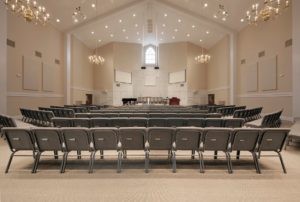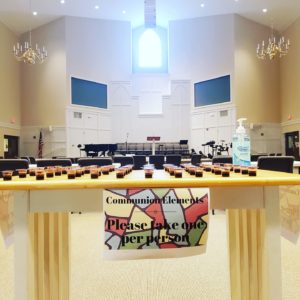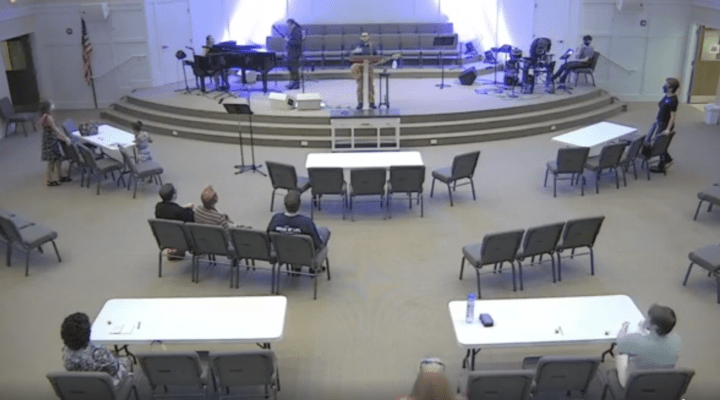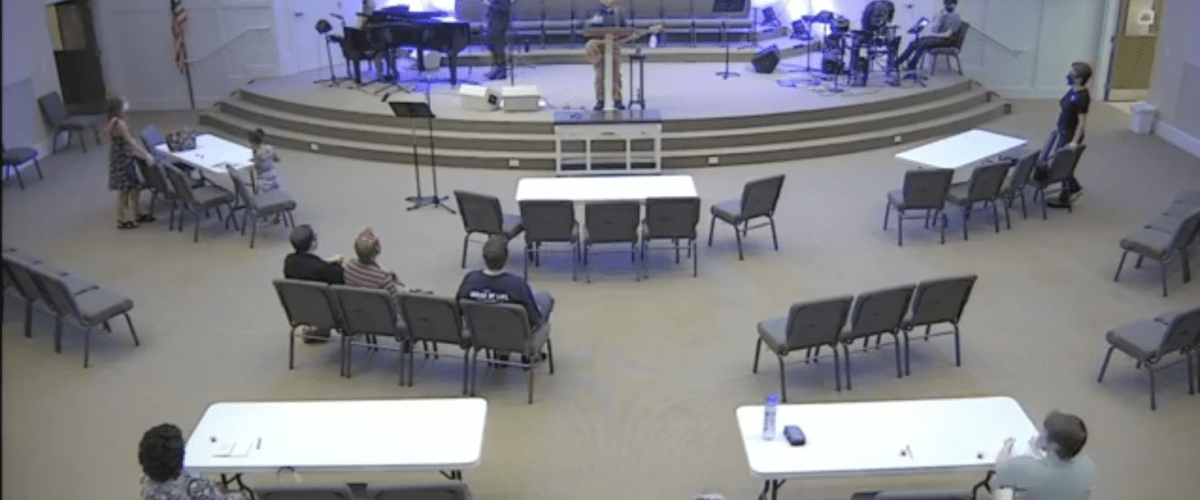We now have gathered for in-person worship for six Sundays after 15 weeks of online-only services. We recognize there are risks involved; we’re doing the best we can to mitigate those risks through the wearing of masks, practicing physical distancing and a myriad of other adjustments. When I enter our building I can’t help but think of the 1970s rock classic, “Signs, signs, everywhere signs — do this, don’t do that … .”

This was the worship setup for Towne View Baptist Church prior to the pandemic. See the large photo at the top of this article for a view of the current setup.
Some will question our decision to provide for in-person worship. We consume far too much time and energy trying to stay informed about COVID-19 from a public safety standpoint and from a faith perspective. There are those who would characterize us as immoral, un-Christian and unconcerned about our community. For our smaller congregation (100 or so in worship pre-pandemic) it was a prayerful, thoughtful and careful process — one we entered with much fear and trembling.
We did not decide to gather for in-person worship because technology failed us. In fact, technology helped us maintain some sense of community and, like many other churches, our online services have been viewed by far more people than those who were worshipping with us in person. Technology allows congregants to experience worship with us even if they are not yet comfortable coming in person. Recorded prayers and Scripture readings help us involve at-home worshippers with our in-person worship service.
We did not decide to gather for in-person worship because we demanded our First Amendment rights. We followed the directives of the state in suspending in-person worship and are trying to implement appropriate guidelines to keep our environment as clean and safe as possible in this season of transition. We value our right to worship and balance that with the commitment to love our neighbor.
We did not decide to gather for in-person worship because we needed the money. Yes, this was a concern in March. If you’ve been involved in church leadership for long you have experienced the reality that you never recover all the offerings you miss due to a snow Sunday in January. Our reality is that we are in better shape financially than we had projected in our budget planning. In our case this has been due partly to some painful budget reductions enacted as a result of the decision last fall to welcome LGBTQ believers as members. God has been faithful, and our people have been generous during these challenging times.
About 45% of our pre-COVID attendance has been present each Sunday. But why do we provide in-person worship when we can’t hug, must wear masks and don’t provide coffee? Let’s stipulate: it is not the same!
 We provide in-person worship for Sandra and Dianne. These are two of our senior women who live pretty much socially distanced lives all the time. With no family in the area, church has become family for them. Despite our best efforts, the technology did not work for them. As we started the conversation among our members, Sandra said: “Jim, I’ll be there; just tell me what to wear and what to do and I’ll be there. And I’ll need a hug.” Judge me if you wish, but on Sunday morning Sandra gets her one hug a week — from her pastor — and I give my one hug to someone not in my family.
We provide in-person worship for Sandra and Dianne. These are two of our senior women who live pretty much socially distanced lives all the time. With no family in the area, church has become family for them. Despite our best efforts, the technology did not work for them. As we started the conversation among our members, Sandra said: “Jim, I’ll be there; just tell me what to wear and what to do and I’ll be there. And I’ll need a hug.” Judge me if you wish, but on Sunday morning Sandra gets her one hug a week — from her pastor — and I give my one hug to someone not in my family.
We provide in-person worship for Bob and Ramona. They each started worshipping with us online this spring. Bob lives in a smaller, rural community with not many options for a gay Christian. He drives 30 minutes on Sundays to worship with us. Ramona is a transgender woman of faith. A place and people of welcome and acceptance provides space and grace for her transition. To pray, “Our Father…” in the presence of others means more to her than I can comprehend.
We provide in-person worship for Katie. Katie, new to faith, is a single mom who depends on her work as a hairstylist (gasp!) to support her and her daughter. She told me last week, “I really miss Wednesday night supper.” We can’t have a meal yet, but even mask-covered smiles and air-hugs let her know we’re here for her.
Each congregation, each person will reach their own conclusions about when the time is right to provide for and/or participate in gathered worship. The decision-making process will be messy, guidance conflicting and outcomes uncertain.
The politicalization of the pandemic — both in the public sphere and in church life — has not been helpful. For some churches “putting people first” will preclude in-person worship; for others of us the well-being of others leads us to provide in-person worship experiences. I hope we can pray for one another as we seek to be faithful to our callings.
Jim Conrad serves as pastor of Towne View Baptist Church in Kennesaw, Ga.


